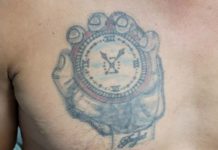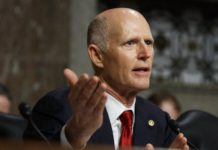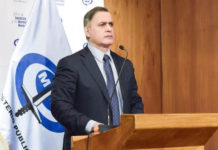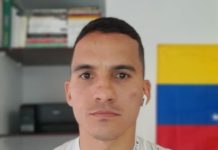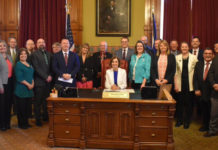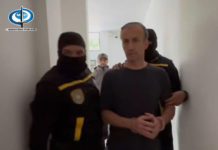

Octubre 15, 2015.-Relying on a Single Icon to Save the Day Is a Mistake, Says Activist Patricia Andrade.
Patricia Andrade is a naturalized US citizen fighting for the freedom of Venezuelan political prisoners. As the director of the Venezuela Awareness Foundation, she is using her background as a trial attorney, coupled with the opportunities her new home affords her, to make her vision a reality.
One month after Judge Susana Barreiros sentenced Venezuelan opposition leader Leopoldo López to nearly 14 years in prison, the activist invites journalists in the region and PanAm Post readers to remember his plight, and remain focused on Venezuela.
When did your work in human-rights activism and aiding Venezuelan political prisoners begin?
It started once Hugo Chávez stepped into power.
Living in Miami allowed me to learn from various immigrant communities. When I compared their situation with what was happening in Venezuela, I realized there was a democratic problem underway.
Our country of origin plays an important role in how our personalities, values, and principles develop, similar to our mothers. So, in this sense, my “mother” had fallen ill, and I needed to tend to her, because she was plagued with a disease called communism.
I supplemented my background as an attorney with a certification program in human rights, which is the first area that we need to address, because where justice is absent, so is democracy.
What is the current situation for political prisoners in Venezuela?
Since 2014, Venezuela has seen arbitrary arrests and torture practices become prevalent in the country and reach new heights.
Previously, during the Chávez administration, there were approximately 600 political prisoners on the lists, compiled over 13 to 14 years. The average was 50 prisoners incarcerated at one time.
During the Maduro administration, these figures shot up to 4,000 per year.
Today, there are approximately 100 political prisoners, which is critical because these prisoners remain incarcerated, and people have forgotten about them. Officials play the delay game, where the judge or the district attorney do not show up, and hearings never happen.
Is the international media overlooking Venezuelan political prisoners?
They really aren’t saying anything about the hardships they endure, or who they are.
There are people who gave their lives for Venezuela, and the media is not focusing on them, because they are unknowns. For example, there are women political prisoners — mothers, wives, single women — who have suffered terrible torture and health problems, and nobody knows or hears about them.
What accounts for the silence regarding women political prisoners?
It is partly because certain activists only focus on iconic cases, like Leopoldo López, who is a national leader. Either unintentionally or due to inexperience, those who surround him have not expanded their efforts.
They often excuse this by saying that once Leopoldo is free, the problems in Venezuela will be sorted out. However, we can’t tell a political prisoner to “wait until Leopoldo is free.” Politicians have replicated this pattern over the past 15 years, saying “wait until elections,” or “wait until this demonstration subsides,” with no results.
In fact, activists who support Leopoldo often work with figures that only represent about half of the reality, and they don’t listen to the rest of us working for the rights of all political prisoners. They just insist their icon is Leopoldo López.
We should feel compassion for all Venezuelan political prisoners.
Do you think the opposition, namely the Democratic Unity Roundtable (MUD), is proceeding correctly?
No. Remember that the MUD is a political group that includes another group within it, and they put their interests above the objective: returning Venezuela to democracy. One can plainly see, from the outside looking in, that there are power struggles going on, and that they work with contacts within the government for their own benefit.
Further, their lack of action is detrimental, and the result is always the same: Chavismo persists in the country.
For example, I had the displeasure of meeting one opposition assemblyman who resides in South Florida, in a multimillion-dollar home. He returns to Venezuela only when he is called back to cast his vote for the opposition. Sometimes he remains at home, so the ruling party can garner a majority.
What can be said for the way the Barack Obama administration handles policies regarding Venezuela?
It’s a train wreck. The Obama administration has been covertly friendly with this government that violates civil rights. How is this possible, when the principles of the United States have always been to uphold civil liberties, the independence of institutions, and respect for human rights
Can you comment on the support you receive from certain Republicans?
Yes. Ileana Ros-Lehtinen, Mario Díaz-Balart, Marco Rubio, and Carlos Curbelo: they have kept their doors open for me, and have been supportive since the beginning. I take petitions to them, and they insist I bring them more. They have been key in our community’s initiatives.
Ileana Ros-Lehtinen, for example, led the bipartisan initiative we promoted in 2014 to sanction Venezuelan human-rights violators who reside in South Florida. Eventually, the bill passed, albeit with a few obstacles along the way.+
What can the United States do at this point to have any impact on Venezuela? Isn’t this a homegrown problem that needs homegrown solutions?
The United States can do something. Venezuelans living in the United States, for example, do not want human-rights violators living next door. There are laws to prevent this from happening, but the Obama administration simply does not fully implement them.
Aside from this, they should take a proactive role in the region. There are no objective observation procedures in place for the December elections in Venezuela, and with their inaction, the US government consents to the impending fraudulent elections.
Will Venezuelans vote for socialism again?
The country is polarized. Some will vote in favor of socialism, and others will vote for the opposition. However, results are always tampered with, and Chavismo will come out ahead.
How likely is it that Venezuelans will receive special asylum status, akin to what Cubans receive?

Cubans have a special law called the Cuban Adjustment Act, but Venezuelans fall into a general asylum category offered to any persecuted person. Any person who meets requirements, seeks counsel, and turns in the correct documentation, will obtain their political asylum, and this is proven by statistics.
Whenever Venezuelans do not achieve asylum status, it’s because they didn’t follow the correct procedure, or they place their fate in the hands of scam artists.
What would you say to those who believe that fighting for Venezuela is not the same when you’re on the outside looking in?
It’s a grave mistake. Venezuelans in Venezuela play one role, while Venezuelans living abroad play another. One cannot do what the other one does. It’s important to recognize the importance of each one, and create a link between the two to work together for a common goal.
What is your message for PanAm Post readers?
Keep an eye on Venezuela. At the height of the petroleum boom, Hugo Chávez sought to penetrate other countries in the región.
For example, he stood behind President Manuel Zelaya in Honduras, and he wanted to bring Honduras into the Bolivarian Movement. Fortunately, Roberto Micheletti was able to keep Honduran democracy standing.
That said, you must keep an eye on the source that funded the destabilizing groups in Honduras; otherwise, we may be faced with “Venezuela: The Sequel

